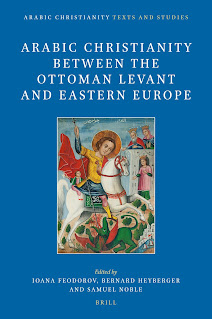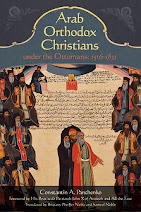Taken from
here (Israeli website).
New Details Emerge on Greek Orthodox Church's Massive Asset Sell-off in Israel - and the Mystery Only Deepens
Senior official explains the Greek Orthodox church’s position for first time, insisting that sales of properties throughout Israel at seemingly rock-bottom prices are necessary and financially sensible
By Nir Hasson
The Greek Orthodox Patriarch of Jerusalem, Theophilos III, is in the midst of an international public diplomacy campaign regarding the management of his church’s lands. On Monday he met with Pope Francis at the Vatican, and over the past two weeks he has met with Jordan’s King Abdullah and Palestinian Prime Minister Rami Hamdallah. Next week he’s scheduled to meet the Greek prime minister and after that, the head of the Anglican Church.
Theophilos is waging war on three different fronts: Against Israeli politicians who are threatening to expropriate church lands to prevent them from falling into the hands of private developers who will undermine the rights of homeowners; against the right-wing Ateret Cohanim association, which is seeking to seize the assets in Jerusalem’s Old City that it bought from the previous patriarch; and against Christian communities in Israel, which are watching helplessly as the patriarch sells off church properties at fire-sale prices. Of these fronts, what worries Theophilos most is confronting the mounting criticism of his asset sales policy within the church itself.
For the first time, a senior church official agreed to explain the church’s position to Haaretz. He insists that the church’s sales of properties throughout the country at seemingly rock-bottom prices were both necessary and financially sensible.
Two weeks ago Haaretz exposed three such sales. The lands were sold at extremely low prices to companies whose unknown are owners because they are registered in tax havens. Some 430 dunams (108 acres) of land were sold in Caesarea for a million dollars, six dunams with commercial tenants at Clock Tower Square in Jaffa went for $1.5 million and an area of Jerusalem's Givat Oranim neighborhood containing 240 apartments was sold for $3.3 million. Even considering that the plots have long-term leases that reduce their values considerably, those prices are still incredibly low.
Other transactions that were conducted seven years ago in Jerusalem have come to light since then. In all cases, the buyer was a company called Koronetti, which is registered in the Virgin Islands and which also purchased the Givat Oranim property. No one knows who the company’s shareholders are.
According to sales contracts obtained by Haaretz, this company purchased a three-story office building on Jerusalem's King David Street, one of the city’s most prestigious locations, for $850,000. Another six-story building on nearby Hess Street, which has stores and the King David Residences luxury residential complex, was bought for $2.5 million; a 2.3-dunam plot in the city's Baka neighborhood was sold for $350,000. All these prices are exceedingly low, despite the decades-long lease agreements for properties there.
“Every square meter here goes for 60,000 [shekels, or $17,000] and there’s potential for 2,000 square meters,” says attorney Yitzhak Henig, whose office is in the building on King David Street. “Someone here won the lottery.”
For the first time since these transactions were publicized, the patriarch is trying to explain his position to the public. He recently engaged a PR firm, Debby Communications. In a conversation with Haaretz, M., a church official who is very close to the patriarch, explains his stance.
“There are no secret transactions,” he says. “There are no shady deals. No one is hiding anything. All the buyers are respected and well-known businessmen who for their own reasons prefer not to be exposed.”
According to M., the church evaluated each property before selling it, got an appraisal and demanded and received a fair price. There are two factors that negatively influence the price of the lands, he says. One is the long-term leasing agreements with the state, some that still have decades to go until they terminate, and the second is the fact that in the future, the state is liable to expropriate the land or otherwise undermine the property rights. The patriarch sees the bill recently proposed by lawmaker Rachel Azaria (Kulanu), under which church lands sold to private developers will be immediately expropriated by the state, as proof of the risk to these church properties in the future.
“We are an organization that’s subject to blackmail in Israel, in the Palestinian Authority and in Jordan,” says M. “Everyone feels they can blackmail us. They’ve turned the patriarchate into a persona non grata.” That’s why he describes these properties as a “disease” that weighs heavily on the church and must be eliminated.
For example, M. says, the original leases signed with the Jewish National Fund for land in Jerusalem's Rehavia neighborhood during the 1950s are like land mines for the church, since they allow the JNF to extend them for many years at very low cost. It seems that the buyers of this land, the Nayot-Komemiyut partnership, don’t agree with him. “We did a terrific deal and I’m not embarrassed to say so,” said attorney Avraham Aberman, who represents the group.
M. goes further in trying to explain the sales. “The patriarchate is an institution spread over three countries; it has no countries behind it, it has no sources of income. Its only sources of income are its properties. It’s an institution that for years bought and sold to fund its expenses. The church owns 10 percent of the land in the Old City and it yields barely a few hundred thousand dollars a year. You ask for rent, but the tenant says, ‘I’m a member of the sect, I’m not paying.’
“When the patriarch assumed his position the church was $40 million in debt; there were properties with liens and in receivership,” M. continues. “He came and instituted a reform. He doubled the salaries of the priests, provided larger budgets to the schools, and for this he needed money. So we have properties that we are interested in from a strategic perspective and there are properties that we sell and from that we support ourselves.”
“We may own the land, but when you have decades-long leases, it’s an abstract ownership,” he says. “Take the deal in Givat Oranim. When we concluded the transaction, there were still 60 years left on the lease. We got an appraisal and we got a price of $6 million. In the end we sold it for $3.3 million but together with the taxes, which the sellers are paying, we ended up getting almost $5 million, which is certainly a reasonable deal. In the Ramle industrial zone we sold 24 dunams for 30 million shekels [$8.6 million]. That’s more than what the Israel Lands Administration is selling for in the same place.”
According to M. the money made through the sales is being invested in yield-bearing real estate in places like Beit Hanina in East Jerusalem and Givat Hamatos in the south of Jerusalem. In both cases, private developers are building hundreds of apartments on church land; in return, the church will get some of them.
Attorney Elias Khoury, a Greek Orthodox Christian and real estate expert, is a sharp critic of the patriarch and rejects M.’s explanations.
“He describes someone bankrupt who wants to sell spoiled goods, but these are the words of someone who doesn’t know what he’s talking about,” says Khoury. “Can you imagine a country selling its lands because it doesn’t want them anymore? These aren’t Theophilos’ private properties, they are the properties of the entire community and they must remain in the community’s hands for generations to come. He’s just trying to minimize the crime they’ve committed.”
In 1999, during the reign of the previous patriarch, Irenaios I, Khoury attended meetings with Rafi Eitan, then the Jerusalem Affairs minister, where they discussed extending the lease on church lands in the Rehavia neighborhood. “Then we calculated that if we took the market value and capitalized it, we would get to hundreds of millions of dollars on Rehavia alone. I told Rafi Eitan to send me the government assessor and he started to laugh. It was clear that the government could never pay that price. Someone trying to get rid of such an asset is a man with no eye to the future.”
Meanwhile, earlier this week, the Jerusalem District Court issued a restraining order on the sale of the Rehavia lands. The patriarchate had filed a petition demanding that the municipality produce a document stating there are no taxes owed on the land. The city argued that it would need a lot more time to gather the information and produce the document. The court accepted this position and froze the transaction for several months.
Next week the patriarchate plans to appeal to the Supreme Court over the sale of three buildings in Jerusalem's Old City to Ateret Cohanim. Two months ago the Jerusalem District Court rejected the patriarchate’s claim that the sales were part of the corrupt operations of the previous patriarch and his treasurer.







